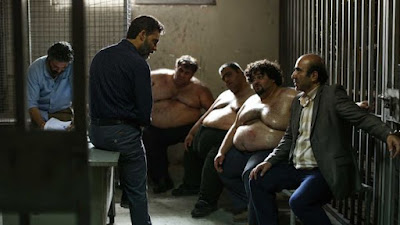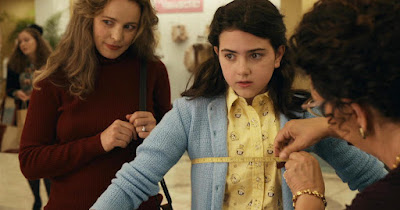Roaring out of the Iranian indie sector - originally under the title Just 6.5 - Law of Tehran is a propulsive, brute-force crime picture with impressively dynamic and combustible crowd scenes, apparently fashioned for import by a thrusting young creative who's hoovered up Heat, Breaking Bad and The Wire and now seeks to reproduce their virtues closer to home. A two-hour shakedown for viewer and characters alike, Saeed Roustayi's film begins with a prologue that establishes a grim bottom line: a chase that results in a suspect being pursued into a ditch, never to emerge. The focus then settles on a cop who all evidence would suggest is just as merciless as his criminal quarry. Entering the frame with several black marks against his name, Samad (Payman Maadi, the husband in Asghar Farhadi's A Separation) has decided to build a case against a local drug kingpin by taking a succession of big swings up (and at) the supply chain; driving out first addicts and street dealers, then the mules bringing product into the country from overseas, he sets about exerting his authority at every turn, with all the force invested in him by the Iranian state, only to come unstuck once he learns his target isn't quite who he thinks it is.
What follows is the definition of arresting cinema, driven for the most part by Maadi's hurricane impatience in the lead role, the character's desire to get through each encounter as soon as possible so as to reach the next level in his pursuit. (A grabber with scant time for small fry, he yanks us all by the ear and collar, as if through a hedge backwards.) Yet in kicking up such a colossal fuss from the get-go, the film also looses certain procedural details that might be perceived as less than complimentary of this regime. Simply being related to a wanted party is here deemed a prosecutable offence; folks are thrown into prison even while their exact status is undecided (Roustayi has the sorry-looking extras to illustrate this point); and, of course, the spectre of execution hangs over them all, including the cop. (One way of approaching Law of Tehran, which also conveys the need for extreme caution when approaching Law of Tehran: what if A Short Film About Killing had been directed not by Kieślowski, but Mel Gibson instead?) If you're looking for comforting honour among the film's thieves, you'll be there all day; they, too, are very much in this game for themselves. This is a film you could show to disprove the creeping notion that movies require sympathetic or relatable characters to be involving in some way; Roustayi's men are volcanic hotheads who - despite the coordinated cool blue of their collective wardrobe, an odd, Michael Mann-ish touch - are prone to volcanic eruptions of self-serving bile.
While it's prowling Tehran's backstreets, the film is nothing short of electric, its growing narrative unpredictability turbo-boosted by the heightened naturalism drilled into Iranian creatives over the past few decades: here is real life with the edge restored, and sharpened to a deadly point. Whenever this camera moves indoors - as with a lengthy layover at central booking - you start to feel it bogging down, although even this seems a deliberate tactic on Roustayi's part, adding as it does to a sense of a too-neat line of inquiry stalling or snarling up. Penning everybody in at close-quarters, meanwhile, further ups the already fervent intensity and volume. It's always up-and-running soon enough, however, barrelling along robustly like a wide receiver who takes multiple explosive hits and still stays on his feet long enough to get the ball in the endzone. (Or, as here, the prisoners into the execution grounds.) A kick-bollock-scramble between bookending black holes, Law of Tehran's idea of justice is unyieldingly rough: its signature image is that of a suspect scouring his hands on the stippled walls of a police station in a bid to rid himself of usable fingerprints. But anyone who's had cause to wonder whether the Farhadi model of cinema might well benefit from a little more agitation should roll up their sleeves and get stuck in.











